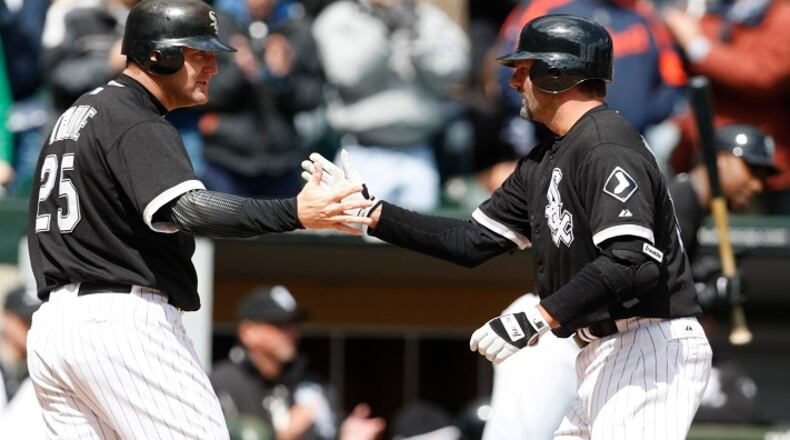Jim Thome’s official title with the White Sox is special assistant to the general manager, but Paul Konerko knows the perfect role in the organization for his former teammate.
“I’ve always said the best money the team could pay Jim is (to) have him just sit in the training room after games and talk to guys,” Konerko told the Tribune. “He can make you think you’re great. I’d be miserable after games and we’d go back to the training room, and by the time I walked out of the hot tub we’re having a beer and talking, and I’d be like, ‘I really am OK.’ ”
Konerko, one of the Sox’s most introspective players ever, savored his four seasons from 2006 to 2009 playing alongside Thome, perhaps their most affable. Konerko will be there Sunday in Cooperstown, N.Y., seeing Thome enter the Baseball Hall of Fame in a class that includes Chipper Jones, Vladimir Guerrero, Trevor Hoffman, Jack Morris and Alan Trammell. It says everything about Thome that each of the six teams he represented as a major-leaguer will take such pride in the pageantry.
Thome hammered 612 home runs in 22 seasons, but, like almost everybody who ever encountered the slugger, Konerko remembered most the way he handled people. Whether Thome was responding to an autograph request at a restaurant or encountering a bat boy after a bad day, Konerko marveled that he “never saw the guy miss with anybody at anytime.”
“I always say playing with Jim literally was one of the highlights of my career,” said Konerko, who won a World Series and made six All-Star teams with the Sox. “Thousands of guys played who didn’t have the talent to get to the Hall of Fame. Then there are guys who got to the Hall but maybe how they treated people was questionable. Jim is probably the best balance. I’d put him up against anybody.”
The sincerity that played in Peoria, Ill., for Thome growing up also worked well at six major-league stops because it was no act. Chuck and Joyce Thome, who died in 2005, raised their five children in central Illinois to consider other people’s feelings before their own and Jim epitomized such unselfishness. According to Konerko, Thome always was the guy organizing team dinners on the road and doing whatever was necessary to relate to the 24 other players on the roster with smaller names and salaries.
“Jim could hit three home runs and then after the game you would see him having a conversation to help out a middle reliever who probably was going to get sent down (to the minors) the next day, just to make the guy feel good,” Konerko said.
Nobody in Chicago felt better than Konerko on Nov. 25, 2005 — the day the Sox traded center fielder Aaron Rowand to the Phillies in a package for Thome. Less than a month after celebrating a World Series title Rowand helped them win, the Sox embraced change that could have been uncomfortable in the clubhouse without Thome going out of his way to ease any awkwardness.
“I was pumped,” Konerko recalled. “We had picked up Hall of Fame-caliber players before in their final years, but we got Jim when he still was a force.
“The truth is, when a guy like that comes to play for you, (he) can let you down in some regard. It’s not quite what you thought, maybe as a person or how (he) worked. But Jim was everything they said he was — and more.”
At the time of the deal, Konerko was in his prime at 30 — five years younger than Thome. Konerko thought he worked hard until the first couple of times he arrived at the ballpark at a time he once considered early. The guy whose finest moment with the Sox came in hitting the clutch home run for a 1-0 victory in the 163rd game of the 2008 season endured many more behind closed doors that made those great moments possible.
“You walk in at 1:30 or 2 in the afternoon and Jim comes walking out in a sweat having already done his stuff,” Konerko said. “He would always say, ‘You’re going to get to a certain age when you wind up spending more time getting ready for this game than playing it.’ That made a big impact on me. I probably added two or three years to my career because of Jim and the way I changed my thinking and work habits.”
That Midwestern work ethic complemented a competitiveness often overlooked because of Thome’s nice-guy persona. But Konerko recalled a moment in 2009 when a Mariners pitcher protecting a healthy lead riled Thome up with a 3-2 changeup that got him out.
“Jim was 38 years old and still pissed after that game,” Konerko said. “He had that fire the public seldom saw. He was like, ‘You have to be kidding me. You’re not going to challenge me when you’re up 10 runs? That never would have happened when I came up.’ I loved that.”
The love for Thome was as real as he was, not always the case on a major-league team where egos often interfere. But when Thome hit his 500th home run on Sept. 17, 2007, to give the Sox a 9-7 walk-off victory over the Dodgers, for example, the joy was genuine.
“It was (as if) we hit it,” Konerko said. “Let’s be honest, in sports every time somebody has one of those great milestones, you really think everybody is happy for the guy? It might look that way, but it’s not.
“With Jim, it really was. Everybody was like, ‘I hope he hits five home runs today and we can see how far they go.’ ”
Thome’s homers usually traveled farther than most, and his character carried him all the way to Cooperstown.
About the Author
Keep Reading
The Latest
Featured


